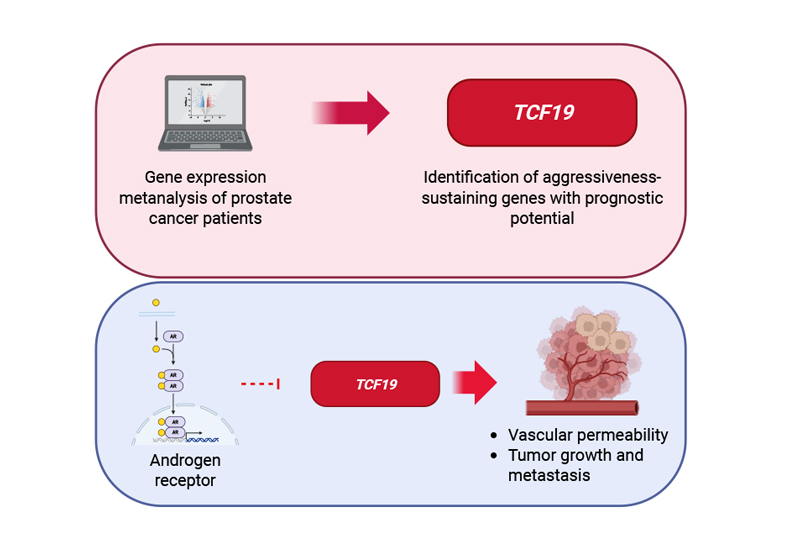
2025/09/26
A key gene could help predict the most aggressive form of prostate cancer
The study, published in Molecular Oncology, reveals that the gene TCF19 plays a critical role in prostate cancer progression, tumor growth, and metastatic spread, highlighting its potential as a prognostic biomarker and therapeutic target for personalized medicine.
What if we could predict which patients will develop aggressive prostate cancer and guide personalized treatment strategies? Researchers at CIC bioGUNE, member of BRTA, have identified TCF19 as a prognostic gene and key regulator in metastatic prostate cancer. Their work, led by Ikerbasque Research Fellow Amaia Ercilla and Ikerbasque professor Arkaitz Carracedo at the Cancer Cell Signaling and Metabolism Laboratory, demonstrates that TCF19 is essential for tumor progression and dissemination, making it a promising focus for cancer research and drug development.
Prostate cancer is the second most common cancer worldwide, affecting millions of patients each year and causing over 350,000 deaths annually. While early-stage prostate cancer is often treatable, a subset of patients develops metastatic and aggressive forms, with five-year survival rates dropping below 40%. Identifying molecular biomarkers that anticipate disease progression is crucial to improving clinical care and therapeutic decision-making.
By combining gene expression analysis across multiple patient cohorts with experimental cell and animal models, researchers showed that TCF19 is upregulated in metastatic prostate patients and that its downregulation significantly decreases tumor growth and metastatic potential. Interestingly, TCF19 expression is inversely associated with androgen receptor signaling, a central pathway in prostate function and cancer development.
This work integrates computational biology, transcriptomics, and experimental oncology, combining patient data with laboratory research. This multidisciplinary approach enables the identification of key genes driving metastatic progression and provides insights into the molecular mechanisms underlying aggressive prostate cancer.
The discovery of TCF19 as a prognostic biomarker and therapeutic target opens the door to personalized medicine strategies, where a patient’s transcriptomic profile could guide clinical decisions, improve treatment response, and reduce side effects.
This research was made possible through collaboration with multiple scientific institutions and the support of the AECC Scientific Foundation and CIBER, highlighting the importance of institutional collaboration and funding in advanced biomedical research.
With these findings, CIC bioGUNE strengthens its commitment to cutting-edge oncology research, advancing the understanding of molecular mechanisms driving prostate cancer progression and the development of more effective targeted therapies
Photograph by: © Figure created using Biorender. Gene expression metanalysis in multiple prostate cancer patient cohorts identifies Transcription factor 19 (TCF19) as an aggressiveness-sustaining gene with prognostic potential. TCF19 is a gene repressed by androgen signaling that sustains core cancer-related processes such as vascular permeability or tumor growth and metastasis.
Reference: Amaia Ercilla, Jana R. Crespo, Saioa Garcia-Longarte, Marta Fidalgo, Sara del Palacio, Natalia Martin-Martin, Onintza Carlevaris, Ianire Astobiza, Sonia Fernández-Ruiz, Marc Guiu, Laura Barcena, Isabel Mendizabal, Ana M. Aransay, Mariona Graupera, Roger R. Gomis and Arkaitz Carracedo. A bioinformatics screen identifies TCF19 as an aggressiveness-sustaining gene in prostate cancer. Molecular Oncology. DOI: 10.1002/1878-0261.70118.
About CIC bioGUNE
The Centre for Cooperative Research in Biosciences (CIC bioGUNE), member of the Basque Research & Technology Alliance (BRTA), located in the Bizkaia Technology Park, is a biomedical research organisation conducting cutting-edge research at the interface between structural, molecular and cell biology, with a particular focus on generating knowledge on the molecular bases of disease, for use in the development of new diagnostic methods and advanced therapies.
About Ikerbasque
Ikerbasque - Basque Foundation for Science - is the result of an initiative of the Department of Education of the Basque Government that aims to reinforce the commitment to scientific research by attracting, recovering and consolidating excellent researchers from all over the world. Currently, it is a consolidated organization that has 290 researchers/s, who develop their work in all fields of knowledge.
About BRTA
BRTA is an alliance of 4 collaborative research centres (CIC bioGUNE, CIC nanoGUNE, CIC biomaGUNE y CIC energiGUNE) and 13 technology centres (Azterlan, Azti, Ceit, Cidetec, Gaiker, Ideko, Ikerlan, Leartiker, Lortek, Neiker, Tecnalia, Tekniker y Vicomtech) with the main objective of developing advanced technological solutions for the Basque corporate fabric.
With the support of the Basque Government, the SPRI Group and the Provincial Councils of the three territories, the alliance seeks to promote collaboration between the research centres, strengthen the conditions to generate and transfer knowledge to companies, contributing to their competitiveness and outspreading the Basque scientific-technological capacity abroad.
BRTA has a workforce of 3,500 professionals, executes 22% of the Basque Country's R&D investment, registers an annual turnover of more than 300 million euros and generates 100 European and international patents per year.
See a large version of the first picture





